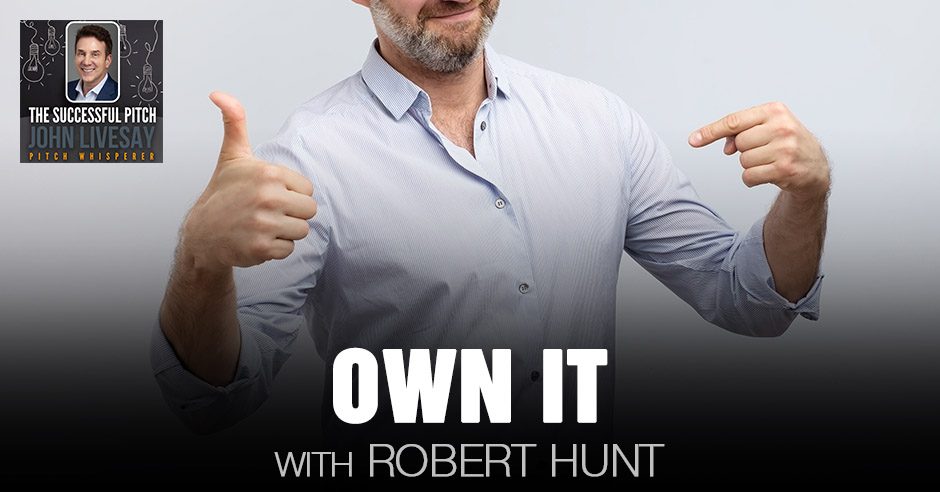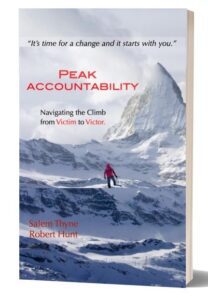Own It With Robert Hunt
Posted by John Livesay in podcast0 comments

With the trials and problems you face every day, do you blame other people or specific circumstances? It’s time to own it. John Livesay sits down for a conversation with Robert Hunt about the importance of accountability. Robert is the business owner and forum leader of Renaissance Executive Forums Dallas. He has been a marketing and sales leader most of his career, but in 2013 he decided to transition his focus to leading business owners and CEOs in monthly peer-to-peer advisory groups. He helps leaders remove obstacles that keep them from being their best. He believes that it’s his purpose in life, and God has wired him to pursue this passion. In this episode, he shares valuable insights on handling stress and pressure as well as the importance of accountability in business and leadership.
—
Listen to the podcast here
Own It With Robert Hunt
My guest on this show is Robert Hunt, who helps CEOs figure out how to remove things that keep them from being their best and more often than not, it has to do with head trash. He said the difference between pressure and success is knowledge because when you have the knowledge, you can make a plan. Enjoy the episode.
—
My guest is Robert Hunt, who’s a business owner and forum leader of Renaissance Executive Forums Dallas. He’s been a marketing and sales leader most of his career, but in 2013, he transitioned his focus to leading business owners and CEOs in monthly peer-to-peer advisory groups. His first group started back in 2013 and it’s been working with small and medium-sized business owners and CEOs in Dallas, and helping them remove anything that’s keeping them from being their best. He also has a new book coming out on accountability. Robert, welcome to the show.
You make it sound so exciting when you say a book in accountability. I also have one on how to grow onions. I don’t think anyone’s going to get excited about it, but I’m super excited about the book.
Do you have a title that might be snazzier than the topic?
We decided at one point we were going to call it Peak Accountability. As we started writing it, we thought, “If someone walked by a bookshelf at an airport or someplace and said, ‘A book on accountability, let me get that.’” I don’t think it’s going to be a grabber. We’re probably going to use the phrase that is the turning point of accountability, which is nobody cares. We’ll probably call the book with a big black cover, red light in red words, Nobody Cares.
It sounds harsh, but if you want to stop being a victim in your life, you have to have this mindset that nobody cares about the reasons why you can’t do this or that. At the end of the day, it’s all up to you and you either own it or you don’t. If you want to own it, you can fix it. As long as it’s someone else’s problem, you don’t have any control over your life. I don’t like being a victim. I want to have the freedom to do things and make a change, but that means you have to own it.
That’s a great tweet you gave us, “You own it or you don’t.” Let me ask you about your own story of origin. What was life like before you started helping CEOs? Give us more details about your background in sales and marketing.
I grew up in Southern California. My career was a marketing agent, coordinator, manager and sales guy. I had a lot of careers in the sales and marketing area. I moved to Texas in 2010 because California was imploding and I needed to get out. It felt like the right time. When we came here, I was doing marketing consulting. I met a guy who had bought the franchise rights for Renaissance Executive Forums. He was telling me what they do. I was listening to him and thought, “People pay you money to help them. That seems so foreign.”
As a marketing guy, you’re always trying to make everything look better than it was. You’re trying to address, “We’ve got all these problems, unhappy customers and the product doesn’t work. Why don’t you get out there and figure out how to tell our story?” I said, “Why don’t we just be a great company and then it’s easy for me to tell the story,” but nobody wanted to go down that road. That was too much work.
[bctt tweet=”Remove things that keep you from being your best.” username=”John_Livesay”]
What I was hearing when I tell that story is I thought, “That aligns with my personal purpose in life,” which became my company’s focus. My purpose in life is I help people remove things that keep them from being their best. That’s how God has wired me. It’s what I’ve done all my life, but I never got paid for it. It’s been this cool opportunity to take my purpose and my passion and have a job that does that. It’s been the greatest combination ever.
I can’t wait to hear a story of an example of one thing you’ve removed for somebody that allows them to be better.
I think the most successful leaders already know what to do, they’re just not getting it done for some reason. A lot of times it’s head trash. I found that you can know to do ABC, but when you’re stuck trying to do it, you can’t get that first step. Coaches don’t tell people what to do. You ask them, “What do they want to do?” They say, “What would you do? What’s the first step?” You said, “Let’s do it right now.” You don’t hold their hand, but you’ve helped them get over the thing that holds them back. Tiger Woods does not need his coach telling them how to hit a ball. He does need his coach to say, “I thought you were going to keep your elbow down. Your elbow is up in the air. Why are you doing that?”
When my clients tell me, “I want to spend more time with my family. I don’t think I’m having the life I want to have.” “What would that look like? What are you going to do? What’s the first step?” All I do is ask him more questions and more questions. They usually self-discover what the solution is. It’s rare that I have to bring up something as an idea to somebody because they’re smart, successful leaders. They run a business with lots of employees. They do it for years, but sometimes the head trash makes it where they can’t see clearly.
I’ve heard of the monkey mind and negative self-talk. I’ve never heard of head trash before, which I love because what a great concept that we can click on it and put it in the trash bin.

Own It: As long as it’s someone else’s problem, you don’t have any control over your life. Don’t be a victim. Have the freedom to do things and make a change, but that means you have to own it.
It sounds that easy, but it is because when it’s not your problem, you look at it objectively. I had a coaching session with a client. He was supposed to do a one-page business plan. It’s a really simple one-page business plan. I gave it to him three weeks ago and he says, “I’ve done the mission vision, core values and purpose but I can’t seem to get my first five strategies down.” I said, “You’re making this too hard. What would you do? If you’re going to drive to New York, what would you do? Get a car. What else? I need some gas. What else? I need a map. What else?”
You got three things, a car, gas and a map. You’re halfway there. I said, “What do you have to do?” He was focused on trying to have additional sales. What’s the first thing you have to do to get more sales? I have to find customers. What’s the first step in finding customers? We started talking, but for some reason, every time he opened up the document, it was giving him anxiety. It’s like this huge test that if he did it wrong, he’d have to wear big Baba glasses. I said, “You’re making this too hard.”
People at that level are worried about perfectionism. Is that part of the problem?
There’s a lot of beat down through COVID from 2020. I think people are a little shell-shocked. I have two sets of clients. One that said, “This was an amazing time of reset. I’ve changed my life, my business. I’ve done all these healthy things and we’ve had amazing growth.” I have another set of group members who have been beaten down. They have to lay off their favorite employees, lose their favorite customers, mortgage their house and all these things to stay alive. It’s been a beat down.
This guy’s been in the beat-down mode. He lost his office building. He had to go move in with someone else to keep going with their business. They lost a lot of great clients. It’s been a hard year. I think at some point you get frozen in stress or uncomfortableness. I think that you need someone who says, “It’s not that big deal. Get a piece of paper, write down the first word. What’s the next word?” That’s that role I play as a coach. He knows what to do. We just had to get some more head trash out.
[bctt tweet=”The difference between pressure and stress is knowledge.” username=”John_Livesay”]
You reminded me, Robert when you said that, of a former guest on the show, Rob Angel, who created Pictionary. When he was trying to start the idea for a game, he got overwhelmed like you were talking about. It was pre-COVID obviously, but “Who am I to do this? I don’t know anything about this,” so and so. He finally made it so simple as you were talking about a roadmap. He got a dictionary, a pad of paper and a pen. He said, “What would be the first word I would make for my game that someone would have to draw?”
He looked up and said, “Aardvark.” He wrote it down and goes, “That would be fun to draw and people would laugh. Now I’m a game-changer and a game creator.” That’s the name of his book Game Changer. You described that almost verbatim. Just start. His whole thing is about finding your aardvark. The fascination of interviewing multiple guests and getting to connect the dots of stories like that is my passion. Thank you for that. That was fascinating to hear you describe it like that of how people cannot make it too hard for themselves and take some next step as opposed to being a deer in headlights, if you will.
I heard this great phrase that says, “The longer you wait to take the first step towards your dream, the lower the chances you’ll ever achieve it.” When I met the guy, who had the franchise rights to this organization here in Dallas, I had no experience facilitating means. I’d never coached anybody for a living and I didn’t have any money saved but I knew that was what God had created me for. I’m wired for that guidance and that role. I knew I had to do it.
I went home and talked to my wife and I said, “I feel like this is the job, the place. This is where everything I am comes together with my passion and my journey.” We knew we had to do it. It was exciting and scary at the same time. Because we took that first step and I got my first group going in six months, which seems like a long time, but it’s fast to do this. You go to some businesses and you’re like, “You don’t know me, but do you want to be in a group with a bunch of your leaders.”
It’s like when I started my show asking certain people to be on the show, “Robert, Kevin Harrington, would you like to be on the show?” It’s a little tricky at the beginning to get people to say yes. Once you’ve got some track record, like you do, it’s a lot easier for people to go, “Look at all these other people who’ve gotten so much out of it.” To launch something is a challenge mindset-wise and momentum-wise. You said something that I find interesting and hopefully helpful to everyone reading, which is, “I knew I was wired for this.”

Own It: There’s no reason you can’t do anything. When you keep blaming why you can’t, you’re a victim and everyone has power over you.
I’m guessing one of your offerings, one of your secret sauces, is you can help other people figure out what they’re wired for, which then leads to another level of confidence beyond, “I think I can do this. I want to do it. I hope I can do it.” I didn’t hear any of that from you. I heard, “I’m wired to do this.” From that grounded faith-based sense of awareness, what a difference that makes?
I think a CEO’s number one job is to cast a vision that everyone else can get excited about. Where there’s a lack of vision, people perish. It is what the Bible says. The reality is that the people who come to work for you don’t need step-by-step on how to do their job. They need a vision of what it looks like when it’s done. Even with my own self, if I don’t have an exciting vision of why I’m doing what I’m doing, it becomes mechanical and it’s frustrating and boring.
When I close my eyes and I see my group members all together in one room and I can see the load of the world they carry being lifted off their shoulders because they’re in a room with other people who know what they’re going through and they feel loved, encouraged, challenged, motivated and inspired. When I see that in my mind, it makes me want to make those awkward phone calls to people who don’t know me and go, “I know you don’t know me, but I know a lot of people. You probably hate cold calls as much as I do. I’m going to ask you three questions and I’ll get off the phone really quick.” If they respond, they do. If they don’t, there are 10,000 more CEOs that I can call here in DFW.
What I find fascinating about what you’re doing is that people come for one thing and then get multiple benefits beyond it. Reading your testimonials, it’s like, “I got so many different perspectives on one problem. The comradery and the relationships I’ve made.” It’s like one thing if you joined the Chamber of Commerce or something else, maybe to network, but that’s not why people are coming. Yet there’s all these additional bonuses of that and that ripple effect.
[bctt tweet=”Some things sound easy, but it really is because you look at it objectively when it’s not your problem. ” username=”John_Livesay”]
I know for myself, when I worked with a healthcare tech company, they hired me to train their team on how to tell better stories to win more sales, “If you help us increase our market share and tell better stories to beat the competition, we’re happy.” Not only did that happen, but then they took all the stories and put them on a repository map. It started breaking down silos, which is as you know, a big problem in every industry. The silos are being broken down because people never knew anybody else’s stories to even make an intro. They had a client in one division, but they never made intros because they never knew a case story.
It’s amazing the similar problems that everybody has no matter what industry they’re in, their journey and their experience. We have four things that we always see in common. People, cash, technology and time. Those four things are the same for every single company. My largest group map, my largest size company is the president of the Coca-Cola bottling company, Southwest here in Dallas with 8,000 employees under his responsibility. He’s a super cool guy. He’s down-to-earth and genuine.
The smallest companies probably did a couple million and yet we all have the same problem when we get together. How do I get more employees to show up for work? How do I get more employees to care? How do we manage cashflow when I can’t buy any chemicals to make stuff or to do jobs? I can’t get raw materials. I can’t get people to show up to do the work. Even the customers who are having problems have enough employees to let us do the work. We’re all dealing with the same stuff. Nothing’s different. It’s a just different color, shape or size.
When you put things into buckets like that, and then you say, “How are other people solving the problem of people,” for example. The other outcome of that repository map where all the stories were, I’d also ask the salespeople to tell their own personal story of origin. What got you into healthcare? “My mom was a nurse. I was a microbiologist. I didn’t want to spend my life behind a microscope,” and all that.
Now, it’s an onboarding tool for new people. The number one thing I hear of people managing salespeople is how do we attract and keep top talent? They’re responsible for it. During the pandemic, they weren’t seeing them in person at annual meetings and this repository map became a way for the team to feel seen and heard. I wanted your insights on that because when we’re kids, we jump in the pool and we say, “Watch me jump in the water, mom or dad.” We want to be seen and heard as kids and validated. That doesn’t go away when we’re in the business world.

Own It: When you feel stressed out, it’s because you don’t have a plan. A plan doesn’t have to be that complicated.
If anything, you need more because it’s such a beat down. What we’ve done is we’ve replaced the relationships we used to have where you would know what house to go to in the neighborhood because all the bikes were stacked out. We’ve got to where I don’t have any friends. I have contacts. I have 4,000 contacts on LinkedIn. People are constantly sending me notes, “Do you know this guy?” I’m like, “I don’t even know how I met that guy.” People send me a request and I stopped accepting requests on LinkedIn for a while.
I would say, “If you want to know me, my phone number or email is right there on my LinkedIn page.” I put it right there. Call me if you want to talk. I don’t need more people on my LinkedIn page. What it did is it gave you this false sense of friendship. There’s a cool song out right now called Pictures of Mountains. It’s beautiful. It talks about no one’s heart ever skipped a beat by looking at pictures of mountains. It says, “I sit outside this restaurant reading reviews of what’s going on inside.” It tells about how we’ve lost connection with the world. It’s poignant for now.
Getting back to being in the moment and not so overwhelmed that it paralyzes us is what I heard from that. Let’s talk about your book. Congratulations, first of all. I know how much work goes into it. You’re obviously already envisioning what it’s going to look like on a shelf and would you pick up a book like that? That’s a tip right there for everybody. Reverse engineer, whatever you’re working on, and then what would it look like? What section of the bookstore is it in? Can I visualize myself speaking at Barnes & Noble? Who would show up? What would I talk about? What’s the problem I’m solving?
We all know what happens when there’s a lack of personal accountability and then going back to managing people. Many people in sales are micromanaged a little bit with CRMs and they all hate filling them out. We need to know how many calls you’re making a day. You need to be accountable. We somehow focus more on the number of calls instead of the quality of the relationships and how close we are to getting a sale. I’d love to hear your thoughts on that.
[bctt tweet=”The longer you wait to take the first step towards your dream, the lower the chances you’ll ever achieve it. ” username=”John_Livesay”]
In that sentence right there, I see so many things that are in that book because the only people who get micromanaged are the people who aren’t doing their job. If I’m rocking it, if I’m a superstar, they don’t even care what I’m doing. They don’t care when I come to work or when I go. The only people who get, “How many calls did you make?” It’s because your numbers are bad. That’s why we’re asking that question. People are so unaware of accountability at the very beginning.
We think like, “Everything’s going on. I take care of my stuff. You take care of your stuff and everything’s fine.” They’re constantly complaining about how the world is not delivering on what they expected or they’re not getting this or that. When some level of accountability comes up into their picture, they’re so quick to dismiss it. If you and I are meeting for lunch and you show up late, you go, “Traffic was horrible. Isn’t traffic always horrible?”
You could have come here 20 minutes early and sat in the parking lot and read your emails. We have a computer on our phone. There’s no reason we can’t be somewhere and still be productive. We look at ways and go, “It’s seventeen minutes to that restaurant, no problem. I’ll do one more email.” All of a sudden, there’s a traffic jam and now you’re late. When the first time they become aware of accountability, whether this is you personally, or you at work or whatever environment you’re in, you blame, then you make excuses or you say, “I can’t,” or at the last part, you wait and hope.
All those four things, you’re a victim. You’re not in control. “I tried that, but this guy was a bad boss. I didn’t get that job. I didn’t get promoted.” If you are a rockstar and you had a bad boss, they’d fire him and keep you. The fact is we want to blame and make excuses and say, “I wasn’t growing my business at the clip that we’re supposed to grow for years.” I’d say, “I’m not good at sales,” but I wouldn’t do anything about it.

Own It: Pressure’s good pressure makes us push to be our best. It makes us creative. It makes us see things beyond where we are today.
I would say, “I’m never really good at sales.” Why don’t you get some sales training? I signed up and paid an awful lot of money to Frank Gustafson in the Fort Worth area. I met with him every week and learned the Sandler philosophies of sales to not only clean up a lot of my head trash, which was keeping me from making sales calls in the first place. My close rate went from 10% to over 90%. It’s because I got sales training and got my head around why I was doing it. Now, it’s amazing.
There’s no reason you can’t do anything. When you keep putting the blame as to why you’re a victim, everyone has power over you, the government, your spouse, your family and the world. When you go, “This is horrible. I hate it.” You acknowledge reality. You embrace the suck and go, “This is going to be a long road, but I’m going to do it.” You make a plan and get it done. Now, you’re the victor over it. It may still take a long time, but you can still control it. If the problem belongs to you, you have the ability to solve it. If the problem belongs to somebody else, you’re a victim. I don’t want to be a victim. I want to solve my problems.
It’s a great perspective on it. It’s that whole premise of, “Is this something I can control?” Live events are canceled. I can’t control that right now. It may be coming back a little bit, but then getting canceled again and all that back and forth. I wanted your opinion on this. The thing that helps me bounce back up, be resilient, which is a key that CEOs need. They need to inspire their team to be resilient is doing what you said. Is this something I can control or is it not?
The awareness that things are not always linear. When I realized that, it helped me. I’m like, “We’re all going to get vaccinated. Everything will go back to normal.” Then it goes, “There’s another variant.” This event got canceled and you thought it was going to be a comeback. It’s a setback. That could be a metaphor for anything. “I fixed this problem. Why isn’t this happening yet?” If you aren’t willing to roll with what’s coming and not realize everything is linear, I think that manages your expectations a little bit.
[bctt tweet=”It may still take a long time, but you can still control it. If the problem belongs to you, you can solve it. ” username=”John_Livesay”]
My mom told me when I was a kid that there are two things you shouldn’t worry about, things you can control and things you can’t control. The reality is a lot less is under control than you think there are. I say, “Business isn’t good, I’m going to go get sales training.” I get sales training. Now I’m a great salesperson. If also the market is tanking and nobody’s buying that stuff anymore, all your great sales training still doesn’t fix the problem if you’re in the same market, selling the same stuff that nobody wants to buy.
I control another aspect. I’ll go to another market or launch a new product. There’s a lot that’s out of your control. You need to be resilient. The CEOs that I have had the most respect for in watching how they have lived their lives and run their business, they’re resilient. They’re not all the best at what they do. They’re not the most brilliant or whatever, but they’re resilient and decisive. They are willing to make decisions, not always the right ones, but they make them and own them. They’re resilient. When something goes wrong, they bounce back and they don’t give up. That’s a huge part.
If someone wants to explore, I am guessing you have to be a CEO in the Dallas area to be part of your forum, correct?
Yes. There are other groups across the country that deal with Renaissance Executive Forums. I focus here in the DFW area.
Obviously, anybody can buy the book?
Yeah.
Any last thought or a quote you want to leave us with, Robert?
[bctt tweet=”There are things you can control and things you can’t control. And the reality is a lot less is under control than you think there are. ” username=”John_Livesay”]
I had a conversation with someone who was stressing out and I reminded him that the difference between pressure and stress is knowledge. When you feel stressed out, it’s because you don’t have a plan and a plan doesn’t have to be that complicated. Sometimes it’s the first step. When you are stressed, it’s like, “Everything’s out of control. What am I going to do? I don’t know what to do.” You then come up with a plan and then you have pressure. Pressure’s good. Pressure makes us push to be our best. It makes us creative. It makes us see things beyond where we are now.
When you feel stressed and overwhelmed, stop. Get some knowledge and let that motivate you to be your best. Sometimes that comes through research, learning and reading, but in our world, it comes through being a part of a group or of other business owners that we lead. I think that’s where great group learning occurs. You end up getting more questions about the things you hadn’t thought about before you make a bad decision.
It’s a great way to end. It’s great information and a distinction between pressure and stress. Thanks, Robert.
It’s my pleasure.
Important Links
- Robert Hunt
- Rob Angel – Previous episode
- Game Changer
- Kevin Harrington – Previous episode
- Better Selling Through Storytelling Method Online Course
Wanna Host Your Own Podcast?
Click here to see how my friends at Podetize can help
Purchase John’s new book
John Livesay, The Pitch Whisperer
Share The Show
Did you enjoy the show? I’d love it if you subscribed today and left us a 5-star review!
- Click this link
- Click on the ‘Subscribe’ button below the artwork
- Go to the ‘Ratings and Reviews’ section
- Click on ‘Write a Review’
Love the show? Subscribe, rate, review, and share!
Join The Successful Pitch community today:
- JohnLivesay.com
- John Livesay Facebook
- John Livesay Twitter
- John Livesay LinkedIn
- John Livesay YouTube
Tags: entrepreneurship, managing people, pressure, solving problems, stress, successful leadership

